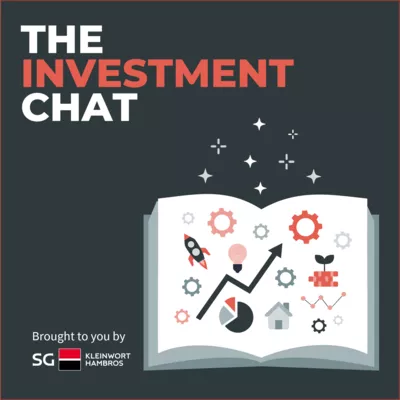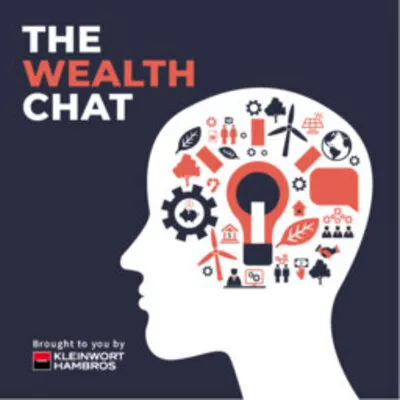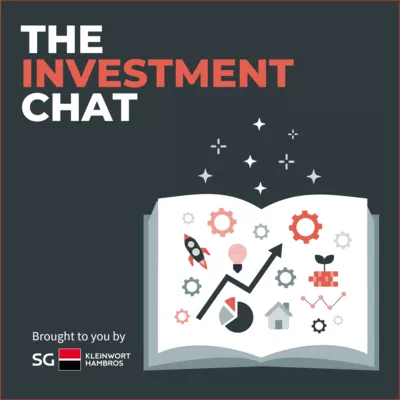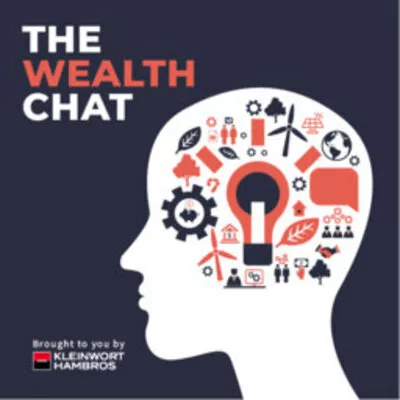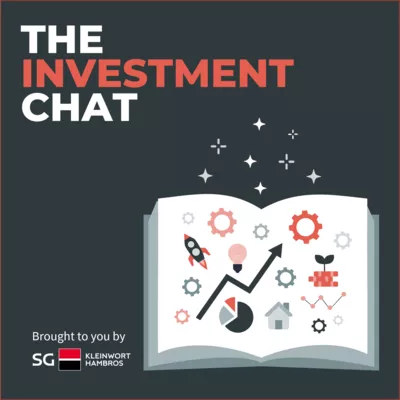
TAKING THE LEAP, with PensionBee
Transcript
The Entrepreneurs' Chat
Ep 1 – Pension Bee
00:00:04
James Hurley: Hello, and welcome back to a new series of The Entrepreneurs' Chat, a podcast brought to you by Kleinwort Hambros. I'm James Hurley, Assistant Business Editor at The Times, and I'm your host for this series. From starting up to scaling up, to selling up, the course of growing a business never did run smooth. In this series, we go behind the scenes exploring the highs and lows that come with scaling a company. Today I'm joined by PensionBee's Romi Savova, founder and Chief Executive, as well as co- founder and Chief Technology Officer, Jonathan Lister Parsons.
00:00:36
Romi Savova: We had the desire and expectation, I think from the very early days that the company would be public. So being public was openly being discussed and talked about for a very, very long period of time. And for us, there was an opportunity to, first of all, raise capital, which we wanted at the time because we continued to grow so quickly, but also to increase our brand and company presence, which is one of the main benefits of being public.
00:01:09
James Hurley: The average worker can expect to work for 11 employers during their career, giving them the headache of having to juggle just as many defined pension contribution parts. PensionBee is bringing the industry sometimes kicking and screaming into the 21st century, allowing you to combine all your pensions into one online part and helping savers combine, contribute and withdraw from their pensions in just a few clicks.
The company's story begins with Chief Executive Romi trying to move her old workplace pension. She has great difficulty switching providers using traditional platforms and financial advisors, encountering archaic systems, excessive fees, and complex paperwork. After this experience, she decides there has to be a better way and starts work on creating PensionBee alongside Jonathan, co- founder and chief technology officer of the business. The company now has billions of pounds worth of assets under management, hundreds of thousands of customers, and its pensions are managed by some of the world's largest money managers. Today we'll delve into their vision of building a better retirement for everyone, talk about their 2021 flotation, and hear a little bit about what it's like trying to disrupt the traditional industry.
So, Romi, to the uninitiated pensions might not seem the most glamorous choice for a startup idea, and presumably you tell them they'd be wrong about that. But take us back to 2014 and the story of how PensionBee was born.
00:02:31
Romi Savova: Sure. I'm happy to give you a bit of background around my own journey, which I think contributed a bit to the start of PensionBee. So I had a background in traditional corporate finance and I had done most of my time at Goldman Sachs and Morgan Stanley always covering the large financial institutions like the banks, pension providers, asset managers, but never having quite experienced them as a consumer. I left a financial technology job in 2014 with that experience in mind, which is around about the time that we met. And it just felt clear that there was a very big opportunity and a terrible consumer experience, which I managed to experience trying to move my pension after leaving a job. And we met and discovered that this is not a one- off, it's actually really common for people to have terrible pension stories.
00:03:32
James Hurley: Jonathan, what was it about this idea that attracted you to it?
00:03:35
Jonathan Lister Parsons: Well, I'd spent quite a while before I met Romi building technical products for entrepreneurs, so working at the early stage of businesses. And what was always in common was that people were digitizing from the start. And I was immersed in kind of an environment and a culture where that was just the norm. And digital services provided to businesses and individuals was absolutely how everybody saw the future.
So when I met Romi and we were discussing the pension industry and how underserved people were by the incumbents, I realized that this was a gigantic domestic market of people who were not being served in a digital way at all. And there also weren't very many people, kind of in the circles that I was moving in talking about the pension industry. There was lots of excitement about fintech, but what that meant really was reinventing what banking meant for people and pensions just weren't getting much of a mention. And that was really exciting because as an entrepreneur you are always looking for an opportunity to do something that other people are not doing because it suggests that there are massively underserved needs.
00:04:55
James Hurley: I was very interested to hear about the origins of the name. Why PensionBee?
00:04:57
Romi Savova: Well, PensionBee is actually a name that my dad came up with very early on in the journey. We had decided that we were going to do something in pensions. The business plan was in the process of being written and we did not yet have the best name. So I enlisted my dad's help, it was over a Christmas holiday actually, and offered him all of the available . com domain combinations and other such factors. And ultimately PensionBee really resonated because obviously it's got pension in the name and that instantly tells you what we're about.
But more importantly, I think the bee as a symbol for the business is one that's really helped us cement the image and the brand of the company. The bee is incredibly hardworking just like our customers. The bee is there just like us gathering all these different parts of the pollen and bringing it together in order to make honey. And once we started going with the bee theme, it's been an insatiable kind of appetite to do bee- related things from having beekeepers who serve our customers to our latest brand campaign that's called Believe in the Bee. We now have an animated bee that we've invested in. There is a lot of yellow everywhere you look, it's kind of the, it's, as I call it, the gift that keeps on giving.
00:06:32
James Hurley: What does your dad make of the scale of the company now, what it's turned into?
00:06:34
Romi Savova: He told me he's available for branding consultations, but I've told him to stick to his day job for now. He's a doctor. So I think the skillset doesn't totally extend into the brand and consultancy space just yet.
00:06:49
James Hurley: Well, look, based on what you guys have achieved, I'm sure there'll be people willing to take on his services. Romi, tell me to what extent was the scale of the opportunity that you saw that made you want to start a business versus having a desire to be an entrepreneur in the first place. Had you always wanted to start a company?
00:07:04
Romi Savova: I don't think I'd always wanted to start a company. I think I'd always been entrepreneurial and had always been a self- starter taking initiative. That's definitely in my DNA and I can track you back to childhood stories where I tried to sell my parents some artwork that I had done. I think it definitely runs in the genes, but I hadn't really thought that I would be an entrepreneur. I always thought that I would work for large corporates.
But I think what really made the opportunity one that was essential for me to pursue is the fact that I had a lot of knowledge around the industry, around the strategy. The opportunity was absolutely enormous. I had tried to transfer this pension, which I found really, really difficult and I'd worked in financial services and it was really that combination of the opportunity together with the customer experience that made everything come together. And ultimately, I think what cinched the deal is the fact that within this product and within this company, there's a great sense of purpose about doing something that is good for consumers. That sense of purpose is really what I think drives all of us to get out of bed every single day. It's what makes this business a life.
00:08:34
James Hurley: And the company was founded in 2014, wasn't it? And I believe you both quit your jobs in 2015, which is always a milestone moment, isn't it, when you're starting a business. Was there any trepidation about that? I'd like to hear from both of you on that point. Jonathan, how big a deal was it for you to quit your job and go full- time on this? And did your family and friends have any reservations about that?
00:08:56
Jonathan Lister Parsons: Well, I dealt with my family and friends' reservations in 2005 when I'd left BT, where I'd started my career. And I left that to become a freelance programmer. And my dad was really not very impressed with the idea of me leaving a corporate pension scheme and a safe corporate job that I was doing well in. But I told him that the software development industry was recession proof and it would be okay. And he eventually started to trust me on that.
I'd been working kind of either for myself or in small companies with a few other people for a number of years. So taking risks around employment was something I was quite used to by that point. And actually having worked with a number of entrepreneurs, quite a number of products by this point, PensionBee didn't seem like it was the risky choice. It seemed like it was the less risky choice because it was something where, as I said before, there was this huge market opportunity. Romi and I had complimentary skills and experiences that were relevant to the problem. And that was really important. And I could see that there was a lot that we could do from a digital point of view to very quickly make a big impact in the sector. So I didn't doubt the kind of market penetration potential and the growth potential. So actually it didn't look like the risky choice.
00:10:26
James Hurley: Romi, same question to you. I mean, you were in a pretty presumably quite lucrative career in investment banking having worked for some famous names like Goldman Sachs. How did you feel about leaving a career like that to go it alone?
00:10:39
Romi Savova: Well, I had also already left investment banking by the time the PensionBee story was born. So I had already made that jump. I had joined a fintech company where I was employee number four and realized that actually I kind of love it, building things from scratch and making things happen. That was really fun. So I had already gotten over some of that. But to really go out on your own, I think it's important to validate a lot. And so I did speak to a lot of potential customers and within pensions, because it's such a large market, virtually anyone can be a potential customer. And the scale of the opportunity became clear once I spoke to anyone and everyone.
I also spoke to a lot of potential asset managers who felt very excited about the idea of taking what are typically considered to be institutional asset management products and making them available in a way that can really help people save for retirement. I think that really aligned with suppliers' visions. And of course investors, by the time we made the big leap, if you will, there were already a lot of investors who were willing to back the company and to give us the runway that we would need to be able to reach the next milestone. So a lot of validation around the various stakeholders had taken place, which I think also reduced the risk of starting fresh.
00:12:25
Jonathan Lister Parsons: I just want to add that what was nice about the pension industry was that every single person that we knew could be a test customer. So when we started, we were using our own pensions as guinea pigs. So we were calling up pension providers, writing them letters, figuring out what pension transfers looked like as an individual and reinforcing the sense that it's an absolute nightmare to do it by yourself. And friends and family were sort of happy to volunteer themselves to participate as well. And that's great because so many companies don't have that advantage. They really have to stretch to find a way to be their own customer, to eat their own dog food as they say in the industry. And that's never been a problem for us to the extent that we enroll our employees into the PensionBee pension scheme. And that means we've got a willing pool of 200 people who will be happy to test out new features or give us feedback on what does and doesn't work.
00:13:24
James Hurley: I kind of think of PensionBee as dragging the industry a little bit into the 21st century. And what surprises me a little bit about your story is perhaps, I suppose, how much money the traditional industry had left on the table for you guys to capitalize on this opportunity. Were you surprised that no one had done this before you, starting with you, Romi?
00:13:44
Romi Savova: Well, there was a perfect set of circumstances that made PensionBee possible in 2014, I would say, from an industry perspective. And of course the major regulatory reform was automatic enrollment, which really started rolling out in 2012. And automatic enrollment made it very clear that most people would wind up with multiple different pension pods. This was a problem before automatic enrollment, absolutely. But AE, as it's called within the industry, made it clear that it would be an ongoing problem for a very long period of time. It was also a big opportunity because as a result of automatic enrollment, the pool of savings ultimately grows and there is an enduring growth engine behind those savings and behind those pensions. And of course, the decline of defined benefit pensions, which had been going on for many years, meant that the pension pods that we help our customers to look after would be the prevailing way that people would save for retirement.
So I do think that we were there in the right place at the right time and what I think made it possible for us to be successful, I guess from what the incumbents were doing wrong, as you started your question, is the fact that even to this day, we are one of the only pension providers that I think actually enjoys serving its customers and going direct to customers. Most pension providers like to intermediate the customer and call them the end customer. And for us, we are actually quite obsessive about our customers and we don't have to worry about intermediaries. We can have that one primary concern and that one primary focus point, and that is what makes us successful, the focus on the customer.
00:15:54
James Hurley: That's really interesting. It sounds like you had kind of a fair wind, I suppose, when you went live in 2016. I think by the following year you already had assets under management of £ 100 million, which is really, really rapid growth. I wondered if you could tell me a little bit about some of the challenges that that must have brought you as a business and indeed as entrepreneurs as well, Jonathan.
00:16:15
Jonathan Lister Parsons: Well, I think growing any business from the start through various different milestones of growth brings challenges in terms of how the company has to adjust to work effectively at the new scale. Because I think when there's just two of you or four of you, you fit round one table and in one room and there isn't really any barrier to information flow and understanding because you're building everything from scratch, everybody knows everything. And there are advantages to that. That's much harder to sustain when you get to even 10 people, 20 people, and you have the need for various different processes to kick in. And then you have 50 people, again, it's different.
We're at 200 people now and it still feels like that's quite a small company relative to a larger enterprise or certainly one of the pension providers that have been around for a long time. And we're still trying to keep things lean and not over- engineer processes and policies and whatnot, but those have to be present and every so often, usually about every six months, we kind of have to sit down and go, well, what's not working now that needs an adaptation for the new sort of volume of customers or volume of pension assets that we look after or volume of staff? How do we continue to resist the urge to become more complex as we grow? That's always a big theme for us as well. So, I think, especially given that I look after the technology of the business, technology just kind of can grow and grow and grow on top of itself. And actually you've got to know when is the right time to revisit earlier decisions and kind of change things so that they are suited to the next phase of growth. Timing those decisions is one of the challenges as well.
00:18:02
James Hurley: Some really good insights there, Jonathan, Romi, have you got any thoughts on lessons that you've picked up in growing this business that might be applicable to other entrepreneurs that enter a sector and then experience rapid growth? What kind of pitfalls do you think they could look out for?
00:18:16
Romi Savova: Yeah, I think the lessons learned along the way are actually pretty timeless. I would say clarify and invest in and understand your vision and your mission and your values pretty early on. Our vision is to live in a world where everyone can look forward to a happy retirement. And it's served us well when we were two people and it's serving us well as we stand at 200 people. Our values and kind of the way we do things around here, which is with love as a core in terms of our communications and our approach, quality, innovation, simplicity, honesty, all of these values, they are timeless and they continue to serve us well and we continue to invest in them and to introduce new joiners to the company, to them in a very explicit and deliberate way. Because scaling a company, growing a company means you're constantly kind of adding new people, adding new customers, and you need to keep everyone quite well aligned.
So I would ensure that those elements of your company are rock solid because they really will serve you over time and they'll help you make the decisions that you need to make when you need to make them. And I think we're definitely living proof of that. But I tend to agree with having to reinvent ourselves every six months to one year as I see it and that's also what keeps things fresh and exciting, because we continue to have a very big growth ambition and we openly talk about having a million customers. So those are some fun objectives to strive for.
00:20:06
James Hurley: Reinvention is an interesting word. Jonathan, I wondered if your relationship with Romi as a co- founder and the pair of you as entrepreneurs, is that something that you have to reinvent as well? How do you keep that relationship strong?
00:20:19
Jonathan Lister Parsons: That's a great question. I don't think we reinvent the relationship. I think we've figured out how to make the relationship work at an early stage and kind of why we're a good combo, I suppose. I think we learned to trust each other very early on. And quite often what would happen in the early days was we were both very passionate about what we were doing. So we would have something that was approaching an argument, maybe not quite an argument, but certainly a robust defense of a position that wasn't the same position. And then we'd go to bed, wake up the next morning and say, "I've been thinking about this and I've come to this conclusion." And it would turn out almost always that we'd both come to the same conclusion.
And that happened just sort of all the time in the early days. And I think that was always really reassuring because it meant that we sort of respected each other's point of view, but also we were trying to be led by the facts, trying to be led by data, be led by our customers. We were always really, really very clear that customer needs and customer feedback is sort of what's driving everything. And so over the years we're probably having fear of those conversations, but that's probably because we're speaking to more people. But occasionally we do and it always reminds me of those early days.
00:21:39
James Hurley: Romi, what about the relationship from your side and how it's evolved over the years?
00:21:45
Romi Savova: Yeah, it stayed fairly similar, I would say, to kind of day zero. We do have different skillsets and there is a trust to consult appropriately and to make sure that the approach that we take, if it has to be, is a compromised approach that we can both full- heartedly support. So I think that that's always been present. I would say that we do spend a fair amount of time together outside of work as well. We aim to run/ walk in on Wednesday mornings. And there have definitely been times where the running has happened after work as well, usually during the summer. And we kind of see each other on a family basis as well, fairly regularly. So I think with your work family, it's important to invest in doing things that are fun, that are different and make sure that you continue to enjoy. I think that's ultimately one of the key things about running your own company. You have to enjoy it because it is a lifelong commitment. So investing in that enjoyment I think is important as well.
00:23:12
James Hurley: And Romi, in terms of you as a leader, manager, entrepreneur, do you think you've been aided by the MBA you did at Harvard? Were there things that you learned there that you've applied to the business?
00:23:23
Romi Savova: I think so, yes, absolutely. An MBA enables you to develop a very rounded skillset, one that teaches you a bit of everything. It doesn't make you an expert in anything, but it teaches you a bit of everything so that you can relate to the other leaders that you have in the company. Neither of us is a marketing expert, we have Jasper for that, but I can relate to what he's saying because I have some of that background and I've seen it applied across industries. Similarly with customer service, there are many aspects around business that it's good to have familiarity with, but as you scale a company, you need to rely on having many leaders in place. So I would say that it helps me to relate to them in the best way possible.
00:24:16
James Hurley: Jonathan, you'd worked with lots of startups, hadn't you, prior to starting PensionBee. I wondered if there were any sort of tips on what not to do that you'd seen in some of those companies. Any mistakes that you'd observed that you came into PensionBee thinking, we must not do these things.
00:24:30
Jonathan Lister Parsons: Yes, I think the main one is not to expend your scarce resources doing the wrong things. And you can apply that in lots of different ways within technology. That means doing things like over- engineering solutions or spending a long time building something that people aren't going to use because you've sort of misunderstood what you need to give them to solve their problems. And that's really at the heart of things like the lean methodology and agile and the idea that you're sort of discovering your customers one by one and making sure you're really hitting their needs when you're searching for product market fit at the start of a business.
But scarce resources, it's not just developers and customers, there's also, how else are you spending your money? Are you bringing in the right team? Are they then using their time profitably for the company's best interests? How are you prioritizing things? Is that really open and transparent and are they really clear that their impact on the business metrics is the biggest that it can be? Or do you accidentally end up creating little silos where people are optimizing for local targets that isn't really moving the needle on the business? And that sort of thing's really, really common in big businesses, but it's absolutely fatal in small businesses because your runway is always limited, especially if you're pre- revenue or if you're making significant losses, which a lot of startups are for a long time. So I think always keeping an eye on those resources in all sorts of different ways, that would be my top tip.
00:26:14
James Hurley: And the business floated, didn't it, last year as a valuation of 365 million. That isn't a process that the entrepreneurs always find easy. Romi, what was it like from your point of view, what were the challenges of taking a private business through to a public sale?
00:26:29
Romi Savova: Well, we had the desire and expectation I think from the very early days that the company would be public. So being public was openly being discussed and talked about for a very, very long period of time. And for us, there was an opportunity to, first of all, raise capital, which we wanted at the time because we continued to grow so quickly, but also to increase our brand and company presence, which is one of the main benefits of being public. And, of course, finally to show the very strong commitment that we place on governance and transparency.
So from our perspective, there are mostly advantages to going public and it is a challenging process. It's a hard process. It's designed to be hard so that you can get the benefit on the other side. And it includes pulling together a lot of work streams, a lot of documents, a lot of meetings with investors. It can be a very grueling time. But having worked in investment banking, I knew fairly well what to expect and what we would need internally on our end in order to be able to do it such that when we took the leap, we had a high level of confidence that we would be able to do it and that we would be successful and that we would raise the capital that we needed to continue growing. So I would say we planned well in advance for it, and I think we were quite aware of the short- term challenge of executing a transaction like that.
00:28:06
James Hurley: Jonathan, I'd be keen to get your thoughts here too, that the flotation went well, didn't it, but then in common with lots of technology companies at the moment, there's been some pressure on the share price. How do you stay focused on the day- to- day as managers and directors and entrepreneurs when the share price is under pressure, but you've still got a lot to deliver on?
00:28:26
Jonathan Lister Parsons: Well, I think it's the case that we've had a very clear goal from the outset that hasn't changed. And having a share price doesn't change that. The mission that Romi alluded to earlier, we're here to make pensions better for everybody and we do believe in this better future. So by focusing on that and focusing the team on that and continuing to make people's performance based on metrics that are related to those sets of goals, then it avoids sort of changing... It doesn't change the tone of the business. You're not suddenly focused on the external perception or the share price because you haven't baked it into your internal metrics.
And we're fortunate that we're always talking about how pensions are this long- term product. Most people are going to put money into their pension and not touch it for 30 years. So it generates a long- term mindset in the business. And so the market decline and the general poor performance of stocks, that's something that we are talking to customers about all the time anyway. So the fact that we're caught up in that net, I don't think it really affects the way we think about the quality of the business. If we can honestly look at how we're doing as a business and feel proud of what we're producing every day and the impact that we're making on society, then the market will catch up. There's the solid fundamentals in ultimately businesses that do well end up being recognized in their share price. So that'll happen.
00:29:58
James Hurley: Sometimes I wonder to what extent customers, pension holders, savers, all of us know where our money is actually going. What sort of interest are you seeing from your customers about where their cash goes? And I know this is an area that you've been launching different products in, for example, towards sustainability. What sort of level of interest are you seeing from your customers in the kind of things that their pensions are financing? Jonathan, why don't we start with you?
00:30:22
Jonathan Lister Parsons: Yeah, well, I'll use a kind of case study example to answer that question, the Fossil Fuel Free Plan that we created. So that was essentially done in response to customer feedback. I mean, first of all, you have to understand we're bringing on a lot of customers who aren't really thinking about their pensions as an investment product. They're thinking about it as a savings product. And so by helping to combine all their pensions and give them a positive experience around managing their pension, we give them some insight into what they've got, what they're paying in fees, how it's doing. And as part of that, we can educate them and make them aware that their money's actually invested in the stock market or in bonds and things. And so that's often when people start to get triggered and start to think about what is their money invested in and is it actually invested in line with their values?
So with the Fossil Fuel Free Plan, what we were doing there for these customers who had taken that step and did want to see their money over this 30- year horizon, going to support companies that were doing things that they felt were in line with what they thought companies should be doing. Then by offering a new plan that screened out fossil fuel producers and anybody in their supply chain, that was something that customers felt would be much more in line with what they would want their money to be supporting. It's feedback like that that's continuing to drive the product roadmap and help us to think creatively about what can we be giving people in terms of expanding our products.
00:31:53
James Hurley: Romi, are you seeing the industry react to what you're doing? Are you seeing competitors pop up? Are there similar services arriving? And if so, how do you feel about that? Do you feel that that's an opportunity to grow what you're doing or is it a threat?
00:32:06
Romi Savova: Well, again, I think it's important to really think about the timing and where we are as an industry. We have witnessed, I guess a change in tone within the macroeconomic environment. And I think for companies that are at an earlier stage than we are, we've invested in our technology and in our brand for almost 10 years now. I think companies that are looking at that and considering that and aspiring to get funding for that, I do think it's going to be a lot more challenging to get that funding and to ultimately be able to grow and to make that investment because it does require a very long- term appetite and a very long- term commitment. And in the current world, I think that that is receding a little bit. So we do have the benefit that we've already done it, we've already raised that capital, we've already made those investments, we've scaled, we've grown the customer and asset base substantially.
And so when we look who's coming up behind us, we don't see very much in the rearview mirror right now. And when we look forward and you look at some of the larger incumbents, I think the companies that have been here for decades, and in some cases I'm sure centuries, not much has changed there as well because of the problem that most of them don't really focus on the customer. And there isn't a sudden burning desire to focus on the customer in the way that we do. In fact, there's quite the opposite. It feels like there is more of a retrenchment to big old companies doing what they know best. So for us, that actually paints a very clear road ahead from both sides, no one coming up behind us, no one in front of us looking back, which enables us to really just push our strategy forward. So I think strategically and from a horizon perspective, this is as clear as it's ever been.
00:34:16
James Hurley: The sort of outmoded nature of the industry that you're describing there has obviously been very good news for PensionBee, but are there aspects of the industry that are frustrating to work within? I know, for example, Romi, you've been quite outspoken, haven't you, about how long it can take for a customer to switch?
00:34:32
Romi Savova: Certainly there are parts of the industry that still rely on paper in order to affect transactions, and we think it's pretty mind- boggling that that is still allowed to exist. And of course, switching for a consumer should be simple and straightforward and predictable. We've been calling for a 10- day pension switch guarantee for many, many years because it is customers' money and they do have a right to manage it in the way that they want to.
00:35:04
James Hurley: Jonathan, can you give us a feel for what the day-to- day feels like for an entrepreneur running a listed company and how that's changed from day one back in 2014?
00:35:13
Jonathan Lister Parsons: I think that being a regulated business, the day- to- day doesn't feel too dramatically different after listing to before because we had a lot of checks and balances, regulations to follow, so our compliance policies were pretty mature and our governance was in place. So that was something that we'd got used to pretty much from the get go, really. So I think really what feels different at this scale, not so much about it being listed or not, but about the scale comes from making sure that, it sort of goes back to a point I made earlier, that everybody in the business is all pulling in the same direction and is able to make a contribution that really meets their potential and helps them to feel like they're developing, they're growing, they can see why they're making an impact in the business, they can see how they can make a bigger impact in the business.
And the feedback channels are open for them to, well, first of all, feel comfortable saying, " Well, I think this should change," or, " I need this opportunity or this support." And then seeing that that's actually acted on and we create the support structures and open up the opportunities and make changes, and that sort of helps the whole business move forwards. And I think my day- to- day is much more taken up with that sort of thing and helping to make sure that the right conversations are happening than, for example, when we started because I was the development team. That's a completely different change. I still really appreciate having the opportunity to get involved in programming. I like to review code. I really enjoy technical architecture discussions and talking about how technology can best serve the business, but there's a much, much bigger department there embedded in a much bigger business. And so I guess kind of the horizontal conversations, if I can call it that, that's where I guess I need to keep my focus.
00:37:16
James Hurley: Romi, similar question to you, but I'd also be interested to hear to what extent the, I guess, enjoyment has changed since 2014. I guess as Jonathan was describing there, the job is somewhat different to eight years ago. Do you enjoy it as much now?
00:37:29
Romi Savova: Yeah, absolutely. I mean, I love having new and different challenges and the growth enables us to have new and different challenges all the time. So I think as an entrepreneur, if you can feel your skillset growing and developing and changing while still delivering on what you've set out to do, I think that that is a great recipe for personal career fulfillment.
00:37:57
James Hurley: And on that theme, final question to you both, and why don't we start with you, Romi. Eight years in, as I was saying, I think best part of three billion under management now, isn't it, where do you see yourself and PensionBee in 10 years' time?
00:38:10
Romi Savova: I see us continuing very much on the mission and vision that we've set ourselves. Pensions are an exceptionally long- term business, and I think for us, there is a clear path to becoming a top 10 and top five pension provider in the country. So we continue to focus on that goal.
00:38:31
James Hurley: So no sign of you heading to the beach just yet. Jonathan, what about you?
00:38:35
Jonathan Lister Parsons: Well, sorry to be boring, but I think it's a similar viewpoint and I think, we mentioned we openly talk about having a million customers, and that's a nice round number, but given that the working population of the country is somewhere in the region of 30 million people, and also there's a bunch of people that don't work anymore that still have pensions. Even at a million customers, we're still only a few percent of the domestic market. The open water in front of PensionBee is just insanely big. And over 10 years, we're not going to get to the point where the business has stopped growing and it's felt like it's one of the incumbents and it's not a very interesting place to work at anymore if you like starting new things and growing things. So there's lots of growth to come and lots of opportunities to develop personally there as well. That is part of where the motivation comes from. There's always a personal stretch and you always feel like you're learning something new and taking on new challenges. So as long as they're there, I'm here.
00:39:39
James Hurley: Romi and Jonathan, thanks for your time. It's been a real pleasure to chat to you today. I'll be back next time speaking to Vivek Tandon, Chief Executive and founder of revalyu Resources, a fast- growing recycling and manufacturing company.
00:39:55
Vivek Tandon: When you're doing a startup company, you're almost always held by how much funding and money you can raise. And definitely in the early days when we started this company, trying to raise money to recycle plastic bottles was a huge challenge, a huge, huge challenge. And there were not too many interested investors to put money in that.
00:40:16
James Hurley: Just click the follow button wherever you're listening to this right now to be notified when that and all future episodes are available. Until next time, goodbye.
00:40:26
Kleinwort Hambros: Does running a business leave little time for managing your personal financial affairs? At Kleinwort Hambros, we know how to simplify life's financial challenges for entrepreneurs. Considering your personal and business ambitions, we partner with you at every stage of your life, taking care of your finances so you can focus on what matters most to you. Find out more about how we can help create a secure financial future for you and your family at kleinworthambros. com.
Ask us your questions
Contact usLatest podcasts
